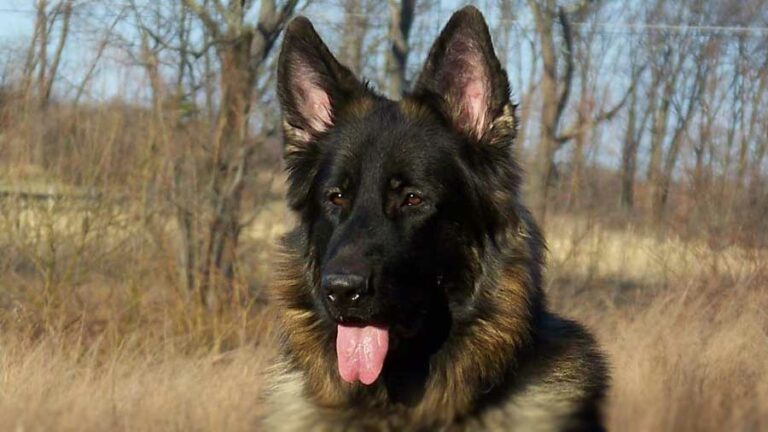King Shepherd vs German Shepherd: King Shepherd Dog Breed Characteristics
The King Shepherd is a newer dog breed that combines the best traits of well-known species. The King Shepherds, a blend of German Shepherds and King Shepherds, were bred in the United States in the late 1900s, intelligently combining the traits of these breeds with the friendly nature of larger dogs like the Alaskan Malamute and the Great Pyrenees.
Despite their large size, King Shepherds are known for their kind nature, making them great for families and single owners.
Their dense coat, the King Shepherd dog breed information feature, needs regular grooming. King Shepherds are also required to exercise enough to stay fit and healthy. King Shepherds, a brilliant breed suitable for search and rescue missions, can be trained for various tasks, making them more than just pets. King Shepherds typically serve as faithful protectors and guide dogs, reflecting the strong bond that can form between humans and their four-legged counterparts, a testament to the King Shepherd dog breed information.
Key Takeaways
King Shepherds blend German Shepherd dog intelligence with friendly traits.
• Ideal for families, these dogs are large but have a gentle disposition.
• They require regular grooming and plenty of exercise to stay fit
Quick Facts
The King Shepherd’s new dog breed information includes it being a striking hybrid dog known for its size. Adult males, part of King Shepherds, are generally between 27 and 31 inches tall, while female King Shepherds range from 25 to 27 inches. According to King Shepherd dog breed information from the American King Shepherd Club, this breed has German Shepherd ancestry and weighs anywhere from 75 to 150 pounds. The King Shepherd, a purebred dog, sports a dense coat that can display various colors, including black, white, tan, brown, gray, or silver.
King Shepherds are calm and flexible, making them perfect for big-yield homes. They connect deeply with their families, and their kind nature means they get along well with kids and other animals.
While they are relatively straightforward to train, new King Shepherd owners should plan for regular exercise to keep these dogs happy. It is also essential to address their potential for health issues such as hip dysplasia and skin allergies.
King Shepherd Dog Breed Pictures
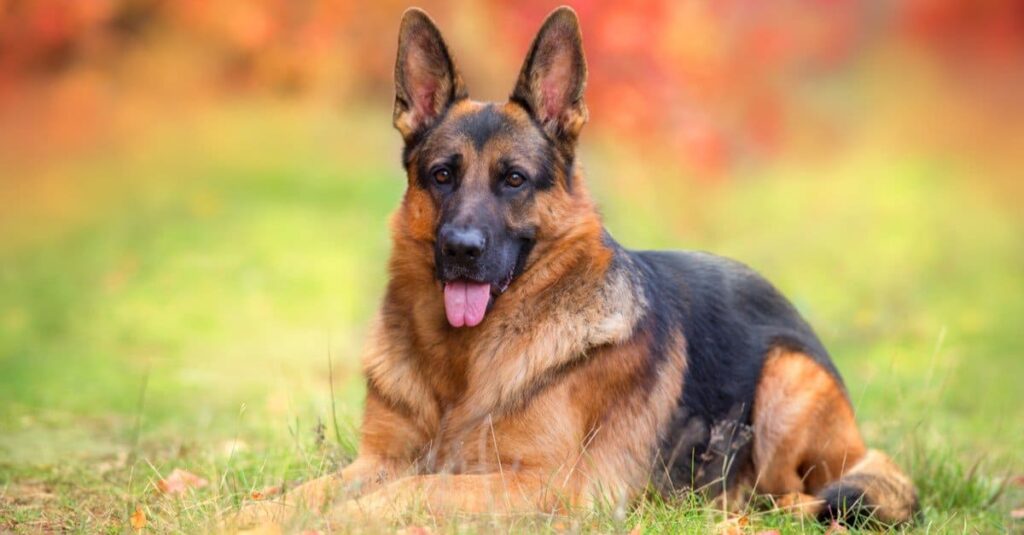
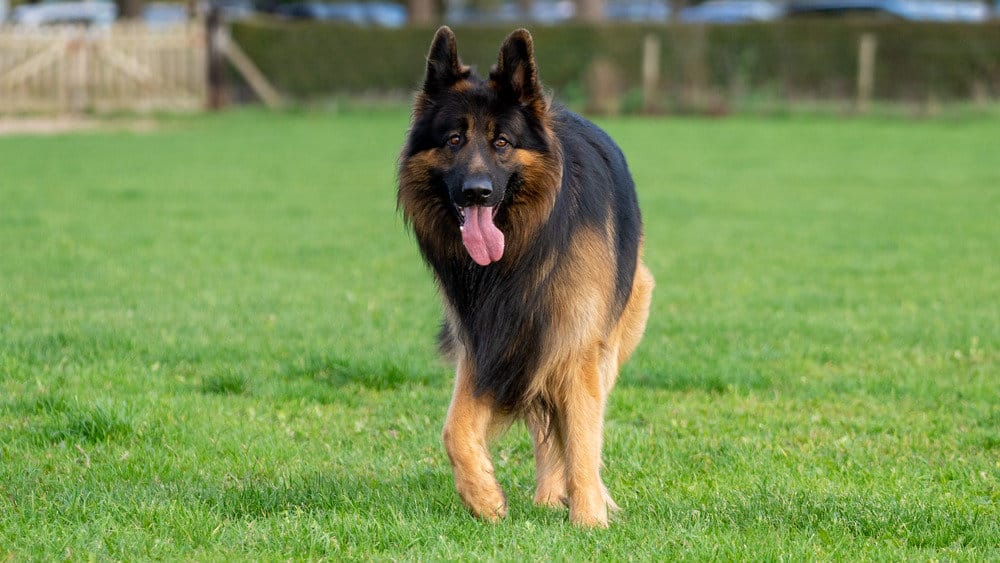
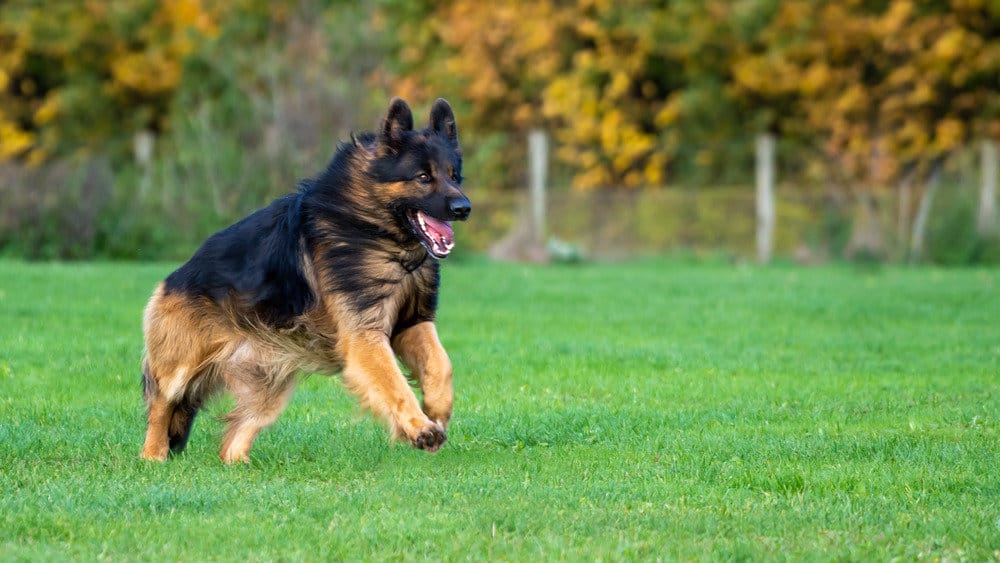
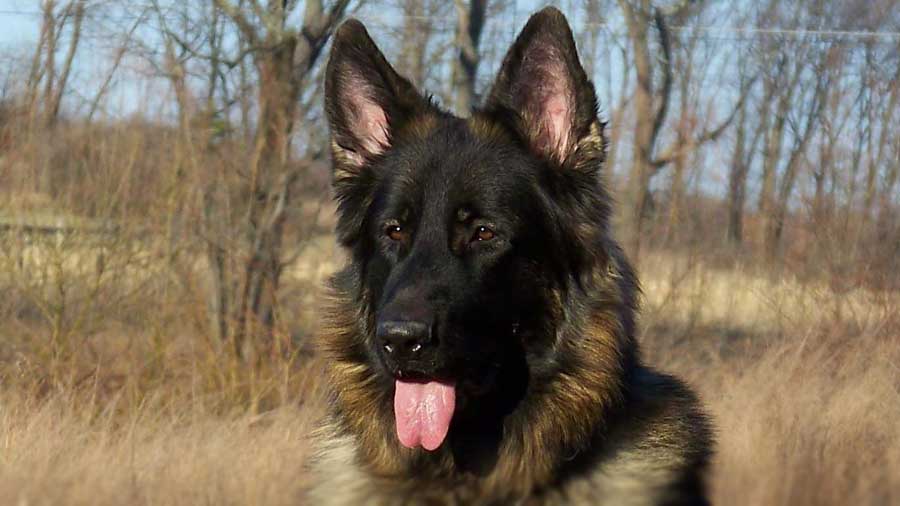
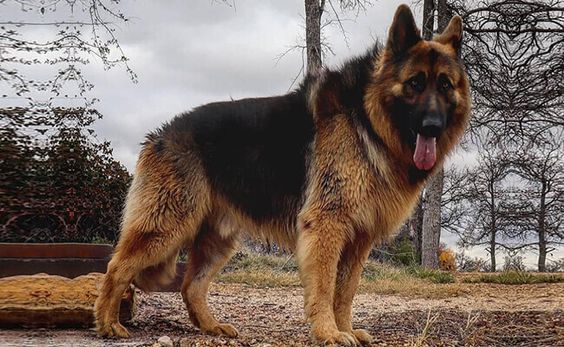

Overview
Building on the foundational traits of the King Shepherd, this section provides a comprehensive overview of the breed, exploring its origins, temperament, and role in a family dynamic.
King Shepherds are distinguished hybrid dogs that emerged in the United States during the 1990s from the careful cross-breeding of German Shepherds and Shiloh Shepherds. This union was concrete with reduced health issues compared to its purebred German Shepherd relatives.
Known for their intelligence and adaptability, these dogs are well-suited to family life, displaying a gentle demeanor towards children and other pets. Requiring ample exercise and consistent grooming, the King Shepherd thrives in environments with space to roam. Their long, coarse coat, varying in colors from black to silver, necessitates regular maintenance.
King Shepherd vs German Shepherd: Breed Distinctions

King Shepherds are known for their impressive size. Adult males can grow to 25 to 29 inches and weigh between 90 to 150 pounds. These large dogs originated in the United States and were created as a more extensive and robust version of the German Shepherd. David Turkheimer is one of the breeders responsible for their development.
These dogs have a long, dense coat that needs to be groomed regularly. King Shepherds are appreciated for their friendly, flexible temperament and their smarts. They do well in various roles, whether as loyal pets or in working environments.
| Aspect | German Shepherd | King Shepherd |
|---|---|---|
| Height | 22-26 inches | 25-29 inches |
| Weight | 50-90 pounds | 90-150 pounds |
| Coat | Short to medium | Long and dense |
| Origin | Germany | United States |
| Use | Working/Companion | Working/Companion |
When comparing King Shepherds to German Shepherds, there are some apparent differences. King Shepherds are taller and heavier, with a height of 25-29 inches and a weight range of 90-150 pounds. Their coat is also distinctively longer and denser. Additionally, while German Shepherds hail from Germany, King Shepherds were developed in the United States. Both breeds are versatile, serving as both working dogs and companion animals.
Origins and Development
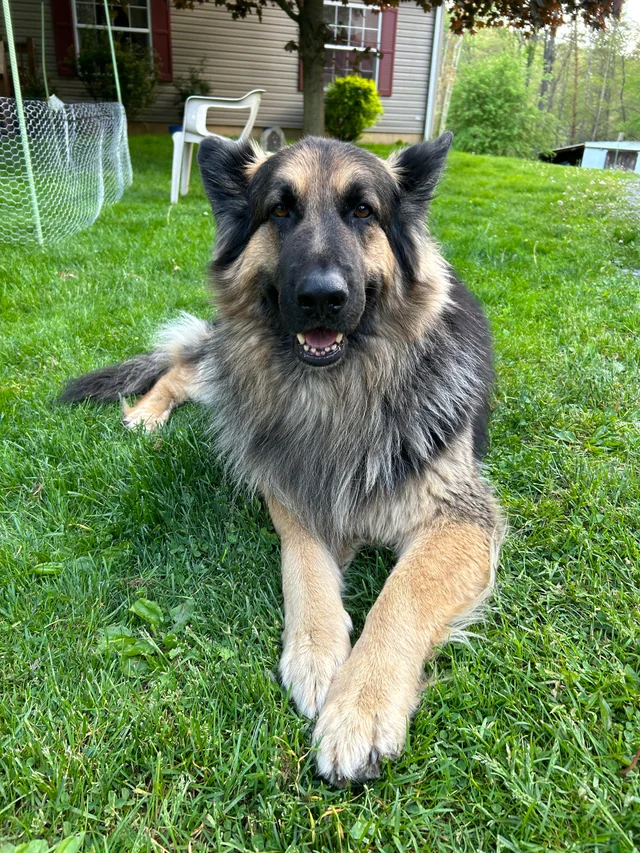
The King Shepherd breed was intentionally created, combining the best traits of the German Shepherd with improvements in health. The journey of this breed included significant steps:
The breed began with a mix of German Shepherds and Shiloh Shepherds. They also added long-coated German Shepherds from Europe to improve the breed’s genetic variety.
The goal was to foster a robust and adaptable working dog with a dependable nature. Breeders also set new standards for the King Shepherd, distinguishing it from its forebears.
These efforts have successfully made the King Shepherd a unique and capable breed in its own right.
Breed Inception Background
The King Shepherd emerged in the United States during the 1990s. This breed is the result of intentionally mixing German Shepherds with Shiloh Shepherds and other larger species. The goal was to produce a robust family companion with better health than its purebred ancestors.
Shelley Watts-Cross and David Turkheimer played vital roles in creating the King Shepherd. They used long-haired German Shepherds from European lines and American-bred German Shepherds.
The breeders also included flock guardian breeds like the Akita, Alaskan Malamute, and Great Pyrenees to improve their protective instincts and work skills.
The first breed club, established in 1995, marked the official recognition of the King Shepherd. This was a significant milestone in the breed’s history.
Key Ancestral Breeds
To truly understand what makes the King Shepherd such a solid and adaptable breed, it’s critical to look at its origins. This breed mixes German Shepherds, Shiloh Shepherds, and other large dog breeds.
Breeders in the United States started creating King Shepherds in the 1990s. Their goal was to create a healthier breed than the purebred German Shepherd. They used long-haired German Shepherds from Europe to bring new genes into the mix. This was done to improve the health and vitality of the breed.
The Shiloh Shepherd, which is big and has a calm nature, was also added. The goal was to create a dog with a unique set of traits. The King Shepherd’s size and good temper come from these dogs and others like the Alaskan Malamute and the Great Pyrenees.
This careful mixing of breeds has given us a dog known for intelligence, protection, and flexibility.
Development Milestones
King Shepherds represent a notable advancement in creating a strong, healthier dog breed, tracing back to cross-breeding efforts in the 1990s. These dogs emerged in the United States as a mix of German Shepherds, Shiloh Shepherds, and the long-haired variants from Europe. The goal was to reduce common health problems found in purebred German Shepherds, focusing on issues like hip dysplasia and skin allergies.
Recognized by various breed clubs, King Shepherds have established a reputation for being gentle giant, versatile, and deeply attached to their human companions. They thrive on interaction and require a lot of companionship to avoid behavior problems that stem from feeling abandoned.
Stature and Build
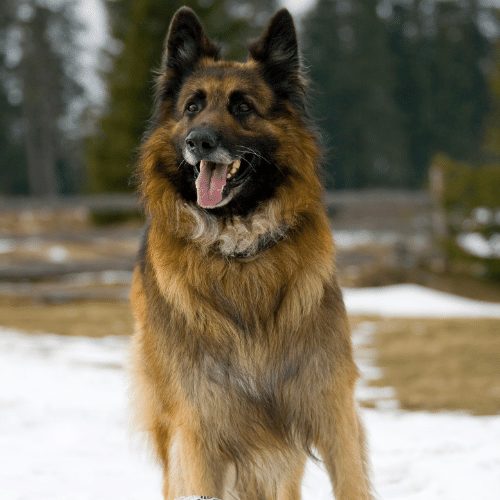
The King Shepherd stands out with its large size and robust physique, a testament to its origins as a working breed. These dogs typically stand between 25 to 31 inches tall at the shoulder and weigh anywhere from 75 to 150 pounds.
Their muscular body is well-suited to an energetic lifestyle, and their proportions reflect both strength and agility, traits they share with other big shepherd dogs. These characteristics give King Shepherds an imposing look and make them highly capable as work dogs and loyal companions.
Average Height Range
King Shepherds are remarkable for their lofty stature, with heights that typically range from 25 to 31 inches. These dogs are easily recognized by their large, muscular frames that command attention wherever they go. Males usually stand taller than the lower range and weigh 90 to 150 pounds. Conversely, females tend to be smaller, with weights ranging from 75 to 110 pounds.
These majestic dogs have a muscular build with a broad chest, a slightly elongated body, and a thick fur tail. The American Rare Breed Association officially recognizes King Shepherds.
These dogs thrive on physical activities and need regular exercise to stay in shape. They excel as working dogs and loving family companions, showcasing their versatility and adaptability.
Typical Weight Span
Male King Shepherds usually tip the scales at a hefty 90 to 150 pounds, while the females are slightly lighter, weighing in at 75 to 110 pounds. Both sexes have a strong, muscular frame that suits them for demanding activities. King Shepherds are known to be larger than many Shepherd breeds, and their size makes them great for work, protection, or as loving pets.
These big dogs need plenty of room to move and regular physical activity to stay healthy and avoid getting overweight. Keeping an eye on their weight is crucial to prevent health problems from being too heavy for their size.
Muscular Frame Description
King Shepherds are known for their imposing stature and muscular physique. They have a broad chest and an authoritative look that makes them stand out. These dogs typically have a height of 25 to 29 inches and weigh between 90 to 150 pounds. They have a muscular body, with a deep chest and a long tail covered in dense fur, contributing to their well-proportioned look. Their thick double coats make them look magnificent and protect them from extreme weather.
Because of their size and weight, King Shepherds can be prone to joint issues such as Hip Dysplasia. To keep them healthy, they must get enough exercise. Regular and energetic physical activity is critical to managing weight and overall health.
Body Proportions
King Shepherds are known for their muscular frames and impressive body proportions, presenting a strong and well-balanced outline. Male King Shepherds stand tall at 27 to 31 inches and weigh 90 to 150 pounds. Female King Shepherds are slightly less, with heights of 25 to 27 inches and weights of 75 to 110 pounds. They have a thick double coat with various textures and colors, contributing to their striking looks. Breeders have concentrated on developing their physical attributes and a calm and adaptable temperament.
Owning a King Shepherd is responsible for being aware of health issues prevalent in large dogs. Hip and elbow dysplasia are common concerns related to size and genetic makeup. These conditions can affect their quality of life, which is why potential owners should consider the health history of their chosen breed. Regular vet checkups and a healthy lifestyle are crucial for the wellbeing of these large Shepherd Dogs.
Breed Size Comparison
The King Shepherd is a large and sturdy dog breed, often outgrowing other shepherd varieties in size. They stand between 25 to 31 inches tall and weigh 75 to 150 pounds, giving them a notable physical presence. Their thick double coat comes in black, tan, and silver colors, contributing to their impressive look.
Although the American Kennel Club (AKC) doesn’t officially recognize King Shepherds, they are similar in size to other giant breeds like the Alaskan Malamute.
Despite their size, King Shepherds are known for their gentle nature. They need plenty of room and regular exercise to stay healthy and happy.
Training Your King Shepherd: Temperament Traits
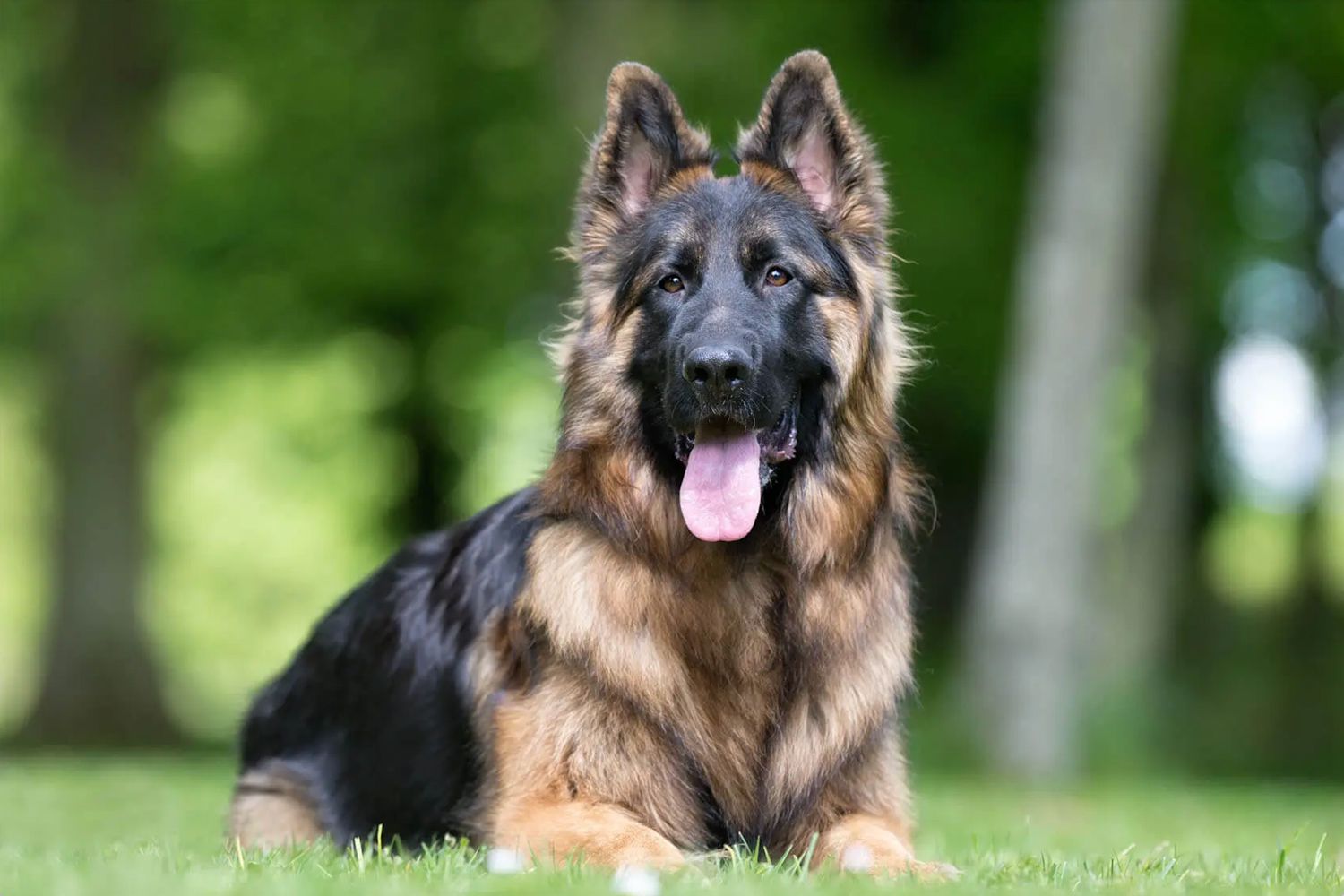
The King Shepherd breed displays various behavioral characteristics highly valued for different activities and ways of life. These dogs are known for their strong bond with their owners due to their undying loyalty. They are also brilliant, which enables them to learn new commands quickly and respond well to training.
These shepherds have a protective nature that makes them excellent watchdogs, always on alert to keep their families safe. However, they need consistent interaction with people and other dogs to stay sociable and manage their energy levels.
Loyal Family Companion
King Shepherds are the go-to dogs for families, thanks to their unwavering loyalty and soft nature. These dogs quickly become part of any household, offering calm companionship. They are incredibly tender with kids, displaying the patience and kindness crucial when interacting with little ones.
King Shepherds are not only innovative, but they also have a strong desire to make their owners happy, which makes them a breeze to train. They quickly become attached to their human families, providing loyalty and protection.
Intelligent Responsive Nature
King Shepherds are highly regarded for their sharp intellect and ability to respond well to their environment. These qualities make them quick learners who can easily handle various situations. King Shepherds learn especially fast when their training involves rewards and praise.
Their eagerness for mental challenges is evident from their need for activities that test their thinking and problem-solving abilities. However, if these dogs don’t get enough mental and physical exercise, they might start acting out.
Protective Instincts
King Shepherds are known for their protective instincts, making them excellent guard dogs. They are fiercely loyal and always looking to keep their family and home safe. These dogs are intelligent and have a solid impulse to protect, so they make such reliable watchdogs.
Because King Shepherds can be territorial, they must be trained and socialized correctly. This helps them to know the difference between a real threat and something harmless and avoids unnecessary aggression. Keeping these dogs busy with activities and mental challenges is also essential. They might start acting out if bored, so keeping their mind and body active for a well-behaved pet is vital.
Socialization Requirements
King Shepherds are known for their protective nature but require thorough socialization. If you’re bringing a King Shepherd into your home, you must know how to socialize them properly.
These dogs need a lot of early training to become friendly and well-behaved adults. It would be best to expose them to different places, people, and other animals in a positive manner to help them become confident and adaptable. Regularly putting them in new scenarios will help them learn good behavior and friendliness.
Use rewards-based training to improve their social abilities. For King Shepherds to be happy and well-rounded companions, ongoing interaction with others is vital to their routine.
Energy Level Considerations
King Shepherds have high energy levels and need ample exercise. They were initially bred for work and companionship, demanding at least an hour of vigorous daily activity.
Regular exercise is critical to prevent behavioral problems like destructiveness. It also helps manage health issues, especially since dense coats require consistent grooming.
Vitality and Wellness Concerns
The health and longevity of King Shepherds rely heavily on being proactive about their care. To ensure these dogs stay healthy, there are several steps owners should take:
- Watch for health issues like hip and elbow dysplasia, common in larger dog breeds. Regular checkups with the vet can help catch these problems early.
- A well-rounded wellness plan that includes physical activity, proper grooming, and activities to keep their mind sharp is vital. This routine helps prevent obesity and keeps their coat and skin healthy.
- Knowing what affects their lifespan is crucial. Genetic factors and living conditions play a significant role. Providing a safe and stress-free environment can lead to your dog’s longer, happier life.
- Feed them a nutritious diet and schedule regular health checks. This helps catch any new health issues swiftly, making them easier to treat.
Health Problem Prevalence
King Shepherds, like other large breed dogs, tend to have specific health issues. They are at risk for genetic conditions such as hip and elbow dysplasia, von Willebrand disease, and hypothyroidism. They must have regular health checks and attentive care from a vet. Good breeding practices are crucial to reducing these health problems. Still, it’s essential for anyone thinking about getting a King Shepherd to know about these potential issues. Testing for genetic conditions is a must to help decrease their chances of occurring.
This breed can also suffer from gastric dilatation-volvulus, or bloat, which is a severe threat to their life. Regular visits to the vet can catch and manage health problems early on.
King Shepherds can have canine atopic dermatitis, affecting their skin health. Keeping an eye on their condition is vital. They need significant special care for their joints while they’re still growing. Daily exercise is also essential to keep them healthy and strong.
Wellness Routine Recommendations
Maintaining health and energy levels in King Shepherds involves a robust wellness routine. These dogs thrive with daily exercise, regular grooming, and consistent vet care.
An hour of active play or running daily helps keep King Shepherds fit and curbs any behavioral issues from excess energy. Their dense coats benefit from frequent brushing, baths, ear cleaning, and nail clipping to reduce shedding and prevent skin problems like atopic dermatitis.
To keep these dogs in top shape, veterinarians should check them regularly. Health screenings can catch issues common to the breed, such as hip and elbow dysplasia, von Willebrand disease, and hypothyroidism. It’s also vital to watch for signs of bloat, which can be life-threatening.
Early detection and management of these conditions are critical to a King Shepherd’s long and happy life.
Lifespan Expectancy Factors
The health and longevity of King Shepherds depend on several key elements, such as genetics, proper healthcare, nutrition, and regular exercise. These dogs are much-loved family members, and their care is a top priority.
Good breeding practices are essential in minimizing hereditary health problems, which can help King Shepherds live longer. Owners must take their dogs for routine vet visits to monitor and manage health issues common to the breed, including hip dysplasia and hypothyroidism.
A well-rounded diet and sufficient physical activity are the cornerstones of keeping these dogs healthy and energetic. It’s also vital for King Shepherds to stay mentally stimulated and to have plenty of social interactions.
Being mindful of these factors that affect a dog’s lifespan allows owners to improve their King Shepherd’s quality of life, leading to a solid and happy relationship with their pet.
Essential Maintenance Routines
Caring for a King Shepherd means dedicating yourself to essential routines that ensure their health and happiness. Here are the leading practices:
Daily Exercise: A King Shepherd thrives on movement. It’s vital to involve them in daily physical activities to meet their energy needs.
Coat Care: Their thick fur requires consistent grooming. This not only keeps their coat in good condition but also controls shedding.
Veterinary Visits: Regular checkups at the vet help prevent health problems and detect any issues at an early stage.
Nutritious Diet: Their meals should be well-balanced, considering the dog’s age, size, and activity, to maintain their overall wellbeing.
Exercise Requirements
King Shepherds require a lot of exercise, at least an hour of intense daily activity. This keeps their bodies strong and their minds sharp. These active dogs do best with activities like long walks, jogs, or runs, vital for their health and happiness. Without enough exercise, these dogs can become restless and develop behavior problems.
Owners must make time for their King Shepherd’s physical needs, just as they would for their grooming. These dogs can adapt to different homes but still need plenty of exercise to be at their best. Owners should be ready to try to keep their dogs healthy and well-behaved.
Grooming Tips
Caring for your King Shepherd’s coat requires regular brushing. Do this at least twice a week to reduce shedding and prevent tangles. Start when they’re just a few weeks old to get them used to it, which helps when interacting with kids or smaller animals.
A bath every two months with a dog-friendly shampoo will keep their coat in good shape.
Ear care is critical to avoid infections, especially if your dog swims.
Nail clipping is necessary monthly to ensure your dog’s comfort while walking.
And don’t forget about their teeth—regular brushing will keep dental issues at bay.
Health Checkups
Regular visits to the vet are crucial for King Shepherds to catch and treat any genetic disorders early. These dogs need to be watched for specific health issues like von Willebrand disease, hypothyroidism, dysplasia in their joints, eye problems, and allergies. Clubs dedicated to rare dog breeds stress the importance of these health screenings. Keeping records in a Pet Registry helps ensure ongoing health management.
King Shepherds should exercise for 60 to 90 minutes daily to stay healthy. Feeding them a well-balanced diet to prevent obesity and performing consistent grooming is vital. These steps are necessary to keep King Shepherds in top condition.
Diet Considerations
Knowing how to feed king shepherds properly is critical to keeping them healthy and enabling them to manage their large size and abundant energy. They thrive on premium food formulated for large breeds, which ensures they get the proper nutrients for their energetic lifestyle. It’s essential to watch their food portions closely, especially as they age because these dogs can quickly put on extra weight due to their large frames and a possible decrease in metabolism.
Regular vet visits are crucial for King Shepherds to monitor for conditions expected in the breed, like Von Willebrand disease, thyroid problems, joint issues, eye conditions, and allergies.
A consistent exercise routine, with at least an hour of vigorous daily activity, is also necessary to keep these dogs in top shape.
Training Strategies
A healthy diet and regular exercise are vital for King Shepherds, but training is also crucial to their happiness and obedience. A consistent routine is best to teach King Shepherds how to behave.
Use treats and praise to encourage good habits since they respond well to positive feedback. Obedience training helps them follow commands and behave correctly.
Socializing them with different people, animals, and places is crucial for their confidence and balance.
Give them puzzle toys and play interactive games to keep their minds active and avoid boredom. These methods help make King Shepherds reliable and devoted pets.
Nutritional Requirements
King Shepherds are known for their strength and energy. To keep them healthy, their diet should be tailored to their needs. Their meals need to include:
- Proteins of high quality are vital for muscle maintenance and recovery.
- They also need plenty of fatty acids to keep their skin and fur in top condition.
- Vitamins and minerals are necessary to support their immune system, keeping them ready to fend off illnesses.
- Carbs provide the energy they need to stay active and playful all day.
Watching their calorie consumption is essential to prevent health problems like weight gain. A well-balanced diet is the key to a happy and energetic King Shepherd.
Balanced Diet Essentials
A King Shepherd’s health and vitality greatly depend on a balanced diet tailored to their needs. These dogs are part of the family and need plenty of exercise, so their diet should match their moderate energy levels. Given that King Shepherds can quickly gain weight, sticking to the feeding recommendations from a vet is essential.
Their food should have plenty of high-quality proteins, carbs, fats, vitamins, and minerals to support their muscle mass and energy.
Consistent vet checkups are essential to keep these impressive dogs in top shape. These visits allow adjustments to their diet that can help prevent or control issues common to the breed, like hip dysplasia and gastric conditions. Regular health monitoring ensures they stay active and healthy.
Special Dietary Considerations
King Shepherds need nutrition that supports their large build and energy. They should eat nutrient-rich food in amounts matching their exercise to avoid joint problems and being overweight.
Puppy diets should promote quick growth and protect their joints. Following the American King Shepherd Club’s nutrition advice is critical.
Regular vet visits help catch health issues early.
Age-Specific Nutrition Needs
King Shepherds, like all dogs, have changing nutritional needs as they grow. Puppies need a diet high in protein and fat to support their rapid development. This ensures they grow up strong and healthy.
For adult dogs, a balanced diet helps maintain their weight and condition. This diet should be rich in lean proteins and essential nutrients.
As King Shepherds age, their diet should help maintain their joint health. Foods rich in omega-3 fatty acids and glucosamine are beneficial for this.
Since the King Shepherd is a newer breed, talking to a vet for a diet plan is a good idea. This should be based on their unique health needs and their activity.

